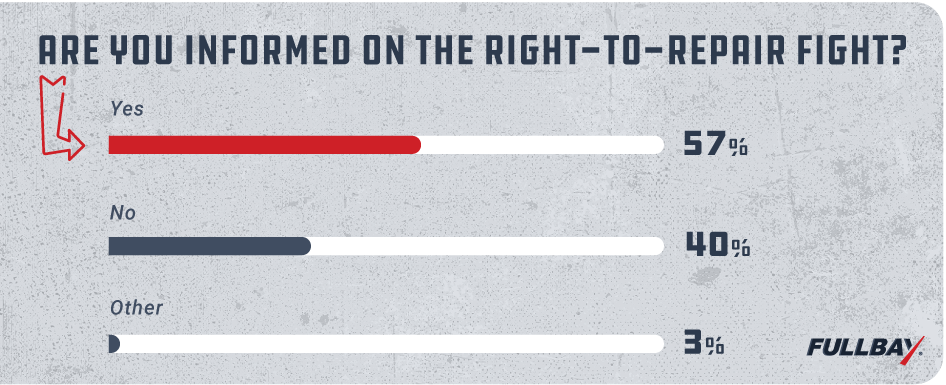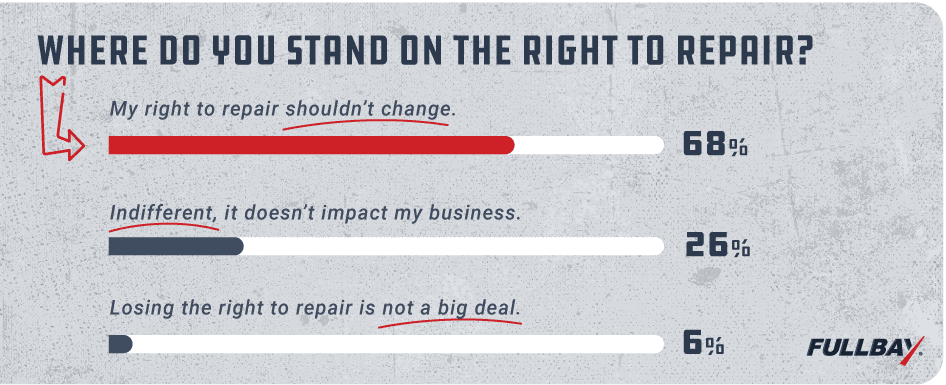You Have The Right to Repair This Truck…Or Do You?

Repairs are a fact of life.
Whether it’s a piece of clothing, a computer, or a car, if you use something often enough you will eventually need to make some kind of repair to it.
Heavy-duty diesel equipment in particular does not have a cushy life, and maintenance and repairs are a critical part of keeping that machinery operating.
I’m aware, Fullbay, you may be saying. I’m reading your blog, y’know.
It’s true. If you’ve landed here, you either work at or run a heavy-duty repair shop. (Or you’re related to or a friend of our writer and have been forced to gaze upon her handiwork.)
So, you know commercial machinery of all sorts needs repairs. And maybe you’re generally confident in your ability to effect said repairs. But are you allowed?
There’s a reason we’re asking this.
While we were pulling together data for our 2021-22 edition of the State of Heavy-Duty Repair, we asked some questions around the Right to Repair battle that is currently being waged by customers and independent repair facilities of all kinds against manufacturers of every stripe. We didn’t end up using that information in our report because the thing already got huge…but one of our takeaways was that a full 40% of those surveyed didn’t know about the ongoing fight.

Since this fight—and the state and federal legislature surrounding it—might have a pretty big impact on the industry, we decided to write about it.
See? There is a method to our madness.
Why are we fighting over the right to repair?
The high-level explanation is this: Manufacturers all over want you to bring your equipment to them for repairs.
If a farmer buys a new tractor from, say, Gondor Truck Co., and it needs maintenance, then they either need to get a Gondor tech to their farm or somehow haul the tractor to a Gondor-approved facility or dealership.
If their regular independent mobile tech rolled out for a look, that tech might find themselves locked out of the tractor’s systems entirely. Can’t access the system? Can’t make the fix.
Hmm. Better take it to Gondor.
Man. How did we get here?
Blame computers.
Well. Start by blaming computers.
You may have heard about the dust-up farmers had (well, are continuing to have) with John Deere, which required any repairs and maintenance to be made by certified John Deere technicians. The requirement is largely centered around the engine control unit (ECU), which has proprietary software on it.
On the non-diesel side of things, you may also have followed the situation with Apple. After what felt like years of angry customers, Apple did recently (sort of) change its stance on letting people repair their own stuff. But prior to that, they did their best to make it impossible: batteries soldered into machines and so on.
The point is, while we’re focusing on the diesel world today, you should know that this tension between independent repair facilities and manufacturers spans industries and countries.
Independent shops and the right to repair
We’ve got some more bonus data from the State of Heavy-Duty Repair to share with you.
We admit we were kind of surprised by the skew between who had heard of the battle vs. who hadn’t. You already know that 40% of those we questioned didn’t know about or simply hadn’t heard of the right to repair battle. Additionally, just over 25% didn’t feel the right to repair would impact their business either way and remained indifferent to it.
Here’s where things get weird. A follow-up question asked if they should have the right to repair, and nearly 70% of our respondents—even those who were indifferent to the fight, or weren’t sure what it was—felt that their right to make repairs as an independent shop shouldn’t change.

If we extrapolate from that 70%, we can safely say that most independent diesel repair shops feel like they should be allowed to work on any kind of machine, regardless of what the manufacturer says. That they haven’t been made aware of the continuing legal battles is just coincidence.
The right to repair—and the potential impact on the industry
You probably don’t need to look much further than the examples above to see how potentially disastrous gating off all new equipment could be to independent repair shops.
The most harmful aspect of manufacturers keeping everything “in-house” (to borrow a marketing term) is that it can throttle competition. What are independent shops going to work on, if everyone is going to the manufacturer’s facilities?
In addition, start thinking about how long those repairs are going to take. If the manufacturer is the only one that can work on a vehicle, they effectively become a bottleneck. If you have one Gondor Trucks-approved repair facility within five hundred miles, then everyone in that region is going to be headed to Gondor Trucks.
That means longer repair times and, for commercial interests, more vehicles laid up instead of out on the road or in the fields working. Boom, now it’s impacting the supply chain, too.
In the manufacturers’ defense
So why do manufacturers bar an owner from visiting an independent repair facility, other than the fact that they make more money if you come to them?
Honestly, it’s the most important reason of all: safety.
The march toward advanced computers running your equipment means it’s no longer a matter of just getting new tires or changing out tired engine parts. There may be significantly complicated software elements that must be updated and adjusted. So if, for example, an unauthorized tech makes a poor repair to a vehicle, that vehicle could later break down or even cause serious harm to its operator or those around it. There are also questions around things like the protection of privacy and customer data, especially when it comes to telematics.
The independent response to that, of course, is “Train us”—but as we mentioned in a prior article, manufacturers tend to dig in their heels there, too. They want the techs they put time and money into training to stay in their ecosystem—understandably, we admit—not take their skills elsewhere.
Even if Boromir the Tech* trains at Gondor Truck Company and then heads to Aragorn’s Independent Repair Shop, Gondor can effectively prevent owners from bringing their Gondor trucks to him by stating in owner paperwork that going anywhere besides the Gondor dealership will void the warranty.
That’s a mild, fantasy-infused example. But things like that happen every day, and if they continue, well, independent shops like the one Aragorn runs will feel the pinch.
Legislative progress
Help is sort of on the way.
Several states have come up with their own right-to-repair legislation. In fact, repair shops in Massachusetts can expect a ruling on April 15, 2022, so we’re joining our customers in that state by keeping an eye on their particular situation.
There is also a federal solution in the works. Last year, President Biden signed an executive order to promote competition by “revers[ing] these dangerous trends” of market consolidation and concentration. In other words, give farmers and others the right to repair. The FTC has been charged with enforcing this order.
A permanent shift, if that’s possible, will probably have to come from legislation. In March 2022, the Fair Repair Act was introduced in the U.S. Senate (it’s very similar to a bill introduced in Congress in June ‘21). Again, the FTC would be enforcing this act, which essentially requires manufacturers to make diagnostic tools, software, parts, and documentation required for repairs available to customers and independent repair facilities.
This all sounds good on paper. Everything you need to make repairs to vehicles and equipment that were previously gated behind manufacturer regulations. But with changes like this will come questions: How are we going to implement them? How, to manufacturers’ credit, are we going to ensure techs are properly trained and making safe, efficient repairs? What is all of this going to look like?
We don’t know. The truth is, no one does; we’ve got to let the laws take effect and see where it all stands afterward. One thing is for sure: we’ll be keeping an eye out.
Until we know more, good luck, and keep on truckin’ (and repairin’)!
*Boromir again, Fullbay, really?
Yes. He’s part of the Example Shop Suz will use from here on out.


